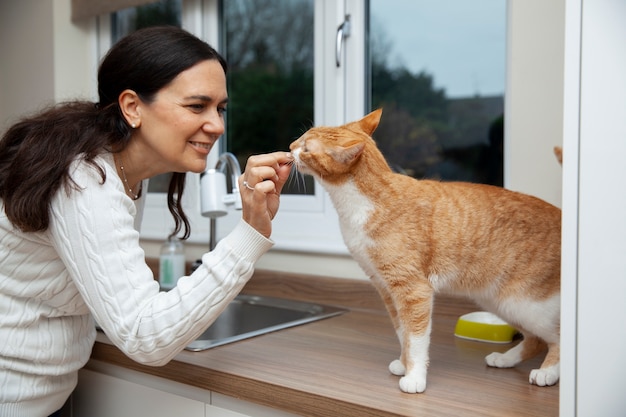Brushing Up on Smiles: Practical Dental Care Tips for Dogs and Cats

Shining a Light on Pet Dental Health
We all know the importance of brushing our own teeth, but did you know that dental care is just as crucial for our furry friends? Dental disease is a common problem in both dogs and cats, and can lead to a variety of health issues, including bad breath, painful teeth, and even organ damage. The good news is that there are a number of things you can do at home to help prevent dental problems in your pet.
Why Dental Care Matters for Dogs and Cats
Dental disease starts with plaque, a sticky film that forms on teeth from food particles and bacteria. If plaque isn't removed regularly, it hardens into tartar, which can irritate the gums and lead to gingivitis (inflammation of the gums). Left untreated, gingivitis can progress to periodontitis, a serious infection that can damage the jawbone and lead to tooth loss.
In addition to the oral health problems, dental disease can also have a negative impact on your pet's overall health. Bacteria from the mouth can enter the bloodstream and travel to other organs, potentially leading to problems like heart disease, liver disease, and kidney disease.
Brushing Your Pet's Teeth: Mission Possible!
The gold standard for pet dental care is daily tooth brushing. Yes, you can actually brush your dog or cat's teeth! The key is to start early and make the experience positive for both of you.
Getting Started with Brushing
Here are some tips for getting started with brushing your pet's teeth:
- Use pet-specific toothpaste: Human toothpaste contains ingredients that can be harmful to pets. Look for a toothpaste formulated for dogs or cats, which often comes in flavors like chicken or beef to entice your pet.
- Choose the right toothbrush: There are a variety of pet toothbrushes available, including finger brushes and soft-bristled brushes designed for small mouths.
- Start slow: Introduce your pet to the toothbrush and toothpaste by letting them lick a small amount off your finger. Gradually work your way up to gently brushing their teeth in circular motions.
- Focus on praise and positive reinforcement: Reward your pet with treats or praise after each successful brushing session.
Alternatives to Brushing
Brushing your pet's teeth can be a challenge for some pets and their owners. Thankfully, there are other ways to help keep your pet's teeth clean:
- Dental chews and treats: These specially formulated chews and treats help remove plaque and tartar as your pet chews on them. Choose dental chews that have the Veterinary Oral Health Council (VOHC) seal of approval.
- Dental wipes: Dental wipes are a convenient way to clean your pet's teeth on the go. Simply wrap the wipe around your finger and gently rub it along the outer surfaces of your pet's teeth.
- Dental water additives: These additives can be added to your pet's water bowl and help to freshen breath and reduce plaque buildup.
Scheduling Regular Dental Checkups
Even with good at-home dental care, it's important to schedule regular dental checkups for your pet with your veterinarian. During a dental checkup, your veterinarian will examine your pet's teeth for signs of dental disease and may recommend professional cleaning if necessary.
Taking care of your pet's teeth is an important part of their overall health and well-being. Whether you choose to brush your pet's teeth, use dental chews, or a combination of methods, consistent dental care can help keep your furry friend's smile healthy and bright for years to come. If you have any questions about dental care for your pet, don't hesitate to contact Express Vets North Canton at (678) 493-5288 or visit us at 149 Reinhardt College Parkway Suite 6,Canton, GA 30114.



















